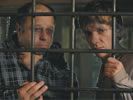Eye For Film >> Movies >> Ward 6 (2009) Film Review
Alexander Gornovsky proved he wasn't afraid of employing cutting-edge methods in his debut 20 Cigaret. Here, tempered perhaps by that experience or, more probably, by working alongside the vastly experienced Karen Shakhnazarov – general director of the redoubtable Mosfilm studio - his co-direction combines the sort of imagination that made 20 Cigaret so exhilarating with a more refined sense of story that means we genuinely care about what happens to the characters.
This imaginative energy is most welcome, since adapting Chekov in a way that brings something fresh to the work is a challenge, particularly when the piece in question - based on the short story of the same name – has been filmed several times before and concerns a subject well-scrutinised by cinema, namely the relationship between the 'madmen' and the 'sane' in an asylum.

Here, the directors retell the story of one man’s mental demise through the recollections of others – carving up Chekov’s words so that they are related by a number of different interviewees, and mixing up the narrative with silent home video footage so that the fragmentary nature of reality, memory and sanity are explored until, by the end of the film, notions of ‘story’ – like the central character’s ‘voice’ - disappear completely.
Dr Ragin (Vladmir llyin) is now an inmate at his own institution, where his successor – and a succession of other colleagues and acquaintances - recount his story, as if to a documentary crew. Gradually, we learn how this stoic-to-the-point-of-couldn’t-care-less psychiatrist comes to be obsessed with talking to Gromov (Alexey Vertkov), a patient with ‘persecution mania’ and – thanks to workplace politics which cost him his job – slumps into a depression which sees him spending more time than he ever dreamed possible with Gromov, only now as his wardmate.
It is this fake documentary framework that proves to be Gornovsky and Shakhnazarov’s most powerful tool. But, in fact, the word ‘fake’ doesn’t really apply here, since the entire film was shot on location in a mental hospital at the Nikolo-Poshehonsky monastery near Moscow. The directors went so far as to ‘cast’ many of the patients as background characters and to use genuine interview footage of them recalling their own thoughts on being in the hospital to open the film. (Inspired by the openness of those they spoke to, Gornovsky went on to shoot a companion short documentary, Dominoes And Checkers.)
These initial scenes, coupled with a later, hauntingly brilliant episode that sees the actual patients dancing with the actors, raise questions about these very ‘real’ people, adding an extra layer to our notions of sanity and beliefs regarding what can ‘cause’ mental illness, as well as inviting us to consider not just those we are looking at but society’s attitudes towards them. Much more complex than it first appears and fully deserving of its selection as Russia’s foreign language Oscar nominee this year, Ward No 6 persuasively prods at our preconceptions of ‘madness’, calling on us not to just look at the exposed prejudices of the story's protagonists but to see how closely they mirror our own.
Reviewed on: 06 Nov 2009
















